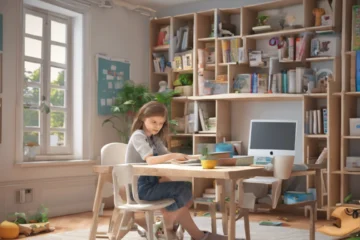As parents, making decisions about our children’s education is one of the most significant responsibilities we undertaking in regards to homeschooling vs pulic school. Two primary options dominate this decision-making process: homeschooling and public school. Each comes with its own set of advantages and challenges, making the choice a complex one that requires careful consideration. In this blog post, we will explore the pros and cons of both homeschooling and public school to help parents make an informed decision tailored to their child’s needs and family dynamics.
Homeschooling and public school represent distinct educational pathways, each with its unique characteristics. While some families thrive in the structured environment of public schools, others find the flexibility and personalized approach of homeschooling more appealing. Let’s delve into the pros and cons of each, starting with homeschooling.
Homeschooling:
Pros:
- Individualized Learning: One of the most significant advantages of homeschooling is the ability to tailor the curriculum to the individual needs and learning styles of each child. This personalized approach allows students to delve deeper into subjects of interest and progress at their own pace.
- Flexibility in Schedule: Homeschooling provides the flexibility to create a schedule that suits the family’s lifestyle. This adaptability accommodates travel, extracurricular activities, and real-world experiences, allowing for a more well-rounded education.
- Closer Family Bonds: Homeschooling fosters stronger family connections as parents actively participate in their child’s education. The increased time spent together contributes to a more profound understanding of each other, creating a supportive and nurturing environment.
- Customized Values and Beliefs: Homeschooling allows parents to integrate their values, beliefs, and cultural perspectives into the curriculum. This customization ensures that the education aligns with the family’s worldview, fostering a sense of identity and continuity.
Cons:
- Limited Socialization Opportunities: One common concern with homeschooling is the potential for limited socialization. While homeschoolers can engage in various social activities, they may not have the same level of daily interaction with peers as public school students.
- Increased Responsibility on Parents: Homeschooling demands a significant time and energy commitment from parents, who become primary educators. Balancing work, household responsibilities, and teaching can be challenging, especially for parents with demanding schedules.
- Potential Gaps in Specialized Knowledge: Homeschooling parents may face challenges in providing expertise in specialized subjects or extracurricular activities. Access to specialized teachers or resources may be limited.
Now, let’s explore the pros and cons of public school education.
Public School:
Pros:
- Structured Learning Environment: Public schools offer a structured and standardized curriculum, ensuring that students cover a broad range of subjects. This structure prepares students for standardized testing and helps them navigate academic expectations.
- Diverse Socialization Opportunities: Public schools provide a diverse social environment where students interact with peers from various backgrounds. This exposure fosters social skills, tolerance, and an understanding of different perspectives.
- Access to Specialized Teachers and Resources: Public schools often have specialized teachers for various subjects, along with resources such as laboratories, libraries, and extracurricular programs. This access can enrich students’ learning experiences.
- Preparation for Real-world Challenges: Public schools expose students to a diverse array of challenges and experiences, preparing them for the complexities of the real world. Interactions with different personalities and navigating a structured environment contribute to personal growth.
Cons:
- Limited Flexibility: Public schools operate on a fixed schedule, offering limited flexibility for families. This lack of adaptability can be challenging for parents and students involved in various extracurricular or non-traditional activities.
- Large Class Sizes: Public schools often have larger class sizes, making it challenging for teachers to provide individualized attention to each student. This can result in some students feeling overlooked or struggling to keep pace.
- Standardized Testing Pressure: Public schools are subject to standardized testing, which can create a high-pressure environment for students. The focus on test scores may overshadow a holistic understanding of each child’s abilities and potential.
Conclusion:
In the choice between homeschooling and public school, there is no one-size-fits-all answer. Each option comes with its own set of advantages and challenges, requiring careful consideration of the unique needs and preferences of the child and family. Some families thrive in the personalized, flexible environment of homeschooling, while others value the structure and socialization opportunities offered by public schools. Ultimately, the decision should align with the educational goals, values, and lifestyle of the family, ensuring the best possible learning experience for the child.
If you would like a combination of both, you should consider BTG Homeschoolers. We do homeschooling right and provide that additional assistance to teachers.



0 Comments